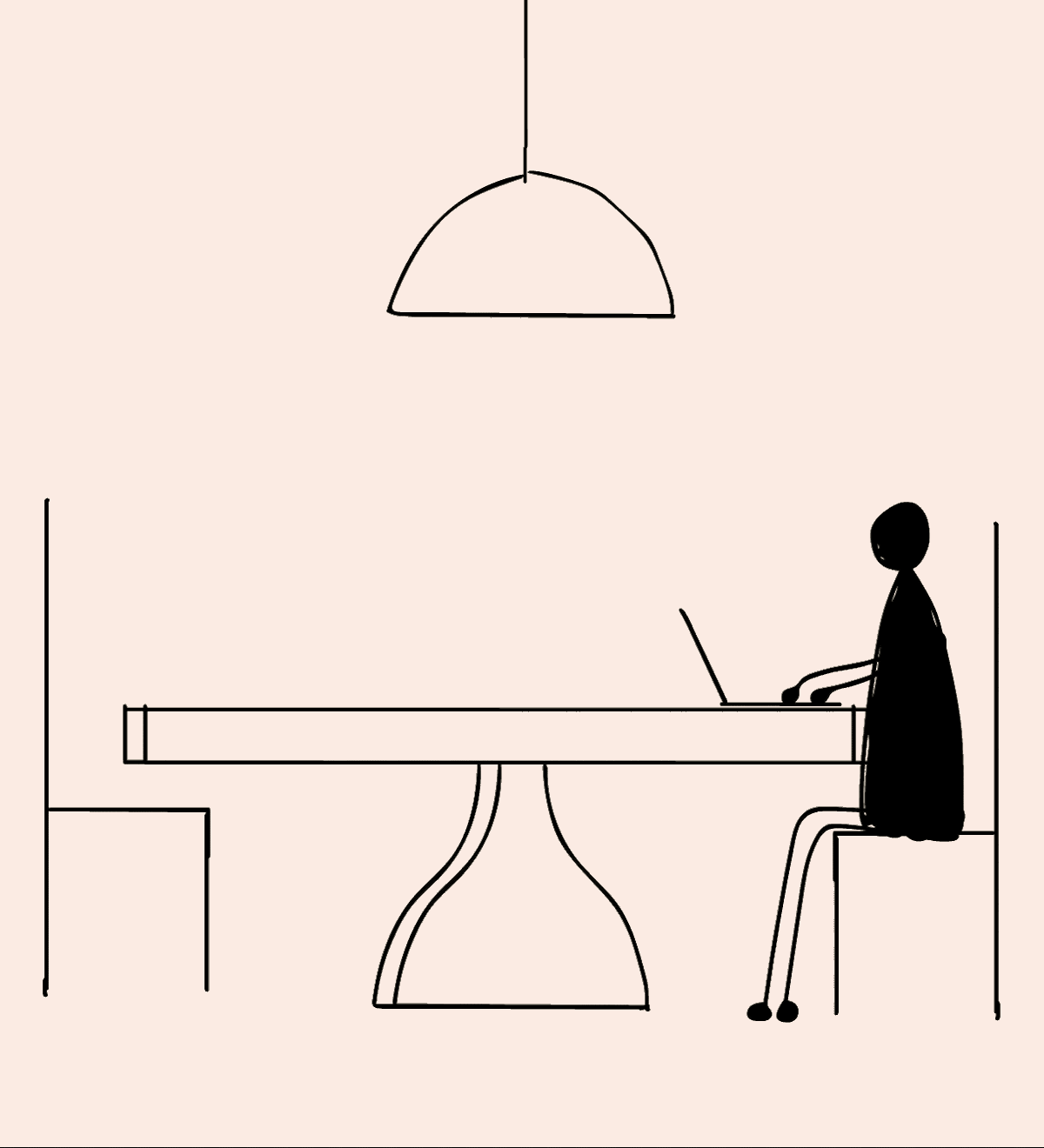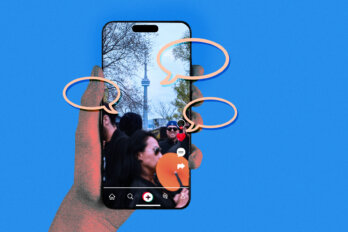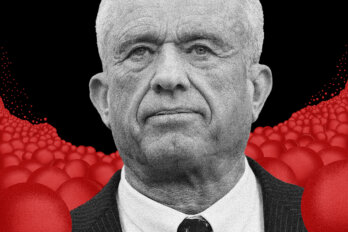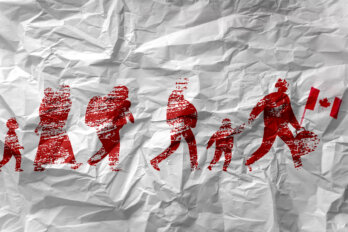I’ve long gotten used to receiving work emails on my phone, seeing reminders about deadlines and urgent requests pop up at all hours, in between texts from friends and family. I check Slack as compulsively as I do Instagram, and my cellphone number is usually listed in my email signatures.
But only in the past few months have I become fully aware of how work has blurred further into my private life—when I saw my personal photos on the wall behind me in a Zoom conference, for example, or had to set aside time in my living room to read the morning news the way I would during a commute. Now that kitchens are de facto break rooms and significant others are like peers in a coworking space, there is no way to isolate work-related anxiety to a single time or place. The internet is flooded with content about the strange new reality: quips about work-appropriate sweatpants, stories of webcam mishaps, and questions about the etiquette of sharing a workspace with the rest of the household. More than ever, we’re being reminded of work’s inextricability from our lives as well as its increasing precarity—which jobs are considered “essential,” who is economically vulnerable, and how workplaces value (or don’t value) their staff.
With the proliferation of communication technology and apps, it’s all too easy to never log off. At The New Yorker, Jia Tolentino writes frequently about capitalism’s darker influence on our lives, and a new form of self-help book urges us to reorient our attention spans: How to Do Nothing; How to Not Always Be Working; and How to Sit.
Two recent books join this investigation: Lurking, Joanne McNeil’s comprehensive history of the social internet, and Anna Wiener’s memoir, Uncanny Valley, which traces the boom of tech-industry optimism. Reading about these problems, we don’t necessarily learn anything new. We already know that the line between work and life is eroding. What is new—and worrying—is the growing understanding of how thoroughly we have adapted. The conflation of work and leisure is the new millennial reality, and it’s time to start imagining ways we might get out of it.
In the early 2010s, Anna Wiener left her dissatisfying publishing job for an opportunity with an e-book company, eventually taking on a data-analytics position in San Francisco. Her memoir, set during the peak of Silicon Valley culture, offers an insider look at a burgeoning digital utopia—the kind that has had a widespread influence on many modern workplaces. Today, the phrase “startup culture” conjures the cliché of a tech-industry office: sloppy hoodies, Ping-Pong tables, employees with official titles like “Rockstar” or “Guru.”
When the physical environment of a workplace becomes enjoyable, it’s easier to think—and talk—about work itself in the same way. In Uncanny Valley, Wiener sees the way her colleagues’ relationships to their jobs are shaped by buzzwords. “People used a sort of nonlanguage, which was neither beautiful nor especially efficient: a mash-up of business-speak with athletic and wartime metaphors, inflated with self-importance,” she writes. “‘We are making products,’ the CEO said . . . ‘that can push the fold of mankind.’” Wiener herself is partially swayed by this logic, at least initially, when she admits that she never thought of the internet involving work “because [she] had never considered that there were people behind the internet at all.”
It’s easy to roll one’s eyes at this type of meaningless fervour, but that self-importance can help a company thrive—not to mention attract eager employees. A recent survey from Canadian HR Reporter indicates that 61 percent of millennials have said they would prefer to work at a business that was “at the forefront of technological advancements”; another survey of Canadian office workers, from ServiceNow, found that 47 percent of millennial respondents would give up a pay raise for more meaningful work.
The language Wiener recounts is nonsensical, but it confers an undeniable excitement and sense of importance—much more than an actual job description could. (Wouldn’t you rather be “pushing the fold of mankind”?) Wiener recalls pep talks invoking “calls to action; front lines and trenches; blitzscaling. Companies didn’t fail, they died. We didn’t compete, we went to war.” It makes sense that, when a company fosters a sense of camaraderie and shared passion, employees will feel more invested in their work. But that optimism can also be dangerously easy to get swept up in to the point where workers may not notice how comprehensively their jobs have taken over their lives.
It’s possible that millennials want more meaningful work simply because they know how much of their lives will be devoted to working—especially as they’re forced to piece together contract and precarious work to make up for the lack of full-time jobs. That there are now new ways to complete work faster hasn’t led to decreased work hours; in fact, a 2015 study from Regus showed that 41 percent of Canadian professionals work a full extra day or more per week. Sometimes this means more time at the office, and sometimes this means more jobs: more than 40 percent of Canada’s millennials have participated in “the gig economy” over the past five years, stringing together freelance work, short-term contracts, and “side hustles” to make up for a lack of stable employment.
While previous eras of disillusionment with the system led to younger generations “dropping out,” today the solution is to lean in and work more. A 2017 ad from freelance-services company Fiverr effectively praises those whose lives have been taken over by work: “You eat a coffee for lunch. You follow through on your follow through. Sleep deprivation is your drug of choice. You might be a doer.” When it comes to job performance, it would seem that doing more is always better.
The transformation of office life is not contained to Silicon Valley—the influence of startup mythology can be seen in any office with a beer fridge. When a workplace is focused on building an ethos and environment of total optimism, coworkers become friends and offices become living rooms (and vice versa). There are obvious upsides to this: most things are flexible, free, and fun. The pervasive trend toward “disruption” in these organizations can offer a promising alternative to the monotonous traditional nine-to-five office. As Wiener describes her startup job, “We were circumventing the fussiness and protocol of the corporate world. We dressed however we wanted. We were forgiven for our quirks. As long as we were productive, we could be ourselves.” But the illusion of utopia can hide darker truths.
When a workplace becomes your social space, it becomes easier for a company to relax its standards around employee treatment—normalizing things like long hours, baffling interview questions, or inappropriate jokes. Businesses built through social interactions, games, and shared interests are still just that: businesses, with profits to gain and bottom lines to meet. A cursory glance through a list of recent job postings shows that a company’s “culture” is often used to entice potential employees, as though the presence of office dogs or weekly happy hours is enough of a reason to take a job that might barely pay minimum wage. More than just “disrupting” the traditional workplace, this tactic is both patronizing and distracting, assuaging workers with free snacks while profiting off their devotion.
These negative effects aren’t contained within the workplace either. Wiener’s memoir ends on the evening of the 2016 US election. There is, above all else, a sense of disillusionment as she surveys the Bay Area housing crisis, the proliferation of alt-right harassment, the negative attitude toward collective action in the workplace. We’ve seen how this story plays out in the following years—the role of Facebook-driven misinformation in political campaigning, the atrocious working conditions of contract tech workers, the arguments about free speech. Yet, still, we keep logging on, perpetuating the culture that gave rise to these crises without realizing that the crises are features of that culture, not bugs.
As a number of workplaces continue to operate remotely during the COVID-19 pandemic, a wave of tech companies—including Facebook, Twitter, and Shopify—have become “digital by default,” meaning that employees may never have to go into the office again. This could be cause for optimism: a company located in an inaccessible office, for example, would now be open to job applicants with mobility aids; money saved in commercial rent could subsidize employees’ growing utility bills; the absence of catered office lunches could lead to a salary increase to help cover grocery costs. But I find it hard to imagine that corporations will ever truly centre their workers, especially in the midst of a disruption like the pandemic. Work has become the centre of so many people’s lives, but that relationship too often remains unreciprocated.
I recently saw a post on social media reminding me that, in this time of social distancing, “you are not working from home; you are at your home during a crisis trying to work.” Although it may seem like a question of semantics, how we frame our actions online is increasingly important as the boundaries between work and life continue to collapse.
In a recent lecture for Haymarket Books, Naomi Klein argued that, in our new home-working reality, our dependence on digital platforms takes on a new meaning. According to Klein, we’re witnessing “a glimpse of this Silicon Valley dystopia that was already in store for us.” As we sit in front of our screens, “our social relations are mediated by corporate platforms . . . and our daily caloric intake is being delivered to us by Amazon Prime, DoorDash, all of these gig employers.” When the whole of our daily lives is mined for data and that data is used to improve the services we use, it’s hard not to feel employed by the internet.
In Lurking, Joanne McNeil explores this notion of free internet labour by building a thorough history of how we act on online social networks. Not that long ago, community on the internet seemed like the future. “People used to talk about the internet as a place,” McNeil writes. Like work, getting online once required a commute, a whirring buzz of dial tones that transported us to the “Information Superhighway.”
But, as we know too well, that distinction between “online” and “offline” barely exists anymore. In the early days of social networks, participation was optional and anonymity the norm. Now, McNeil argues, “visibility is demanded from social media users: without a Facebook profile, you might be deemed untrustworthy and lose out on professional opportunities.” Users are increasingly expected to share real data about themselves, and with the advent of smartphones and high-speed internet, participation is all but mandatory. Carrying around a device with instant access to social networks meant that suddenly, as McNeil points out, “the internet realm and the world outside your phone were—while not quite one and the same—interleaved, entwined, mutually dependent.”
Both Lurking and Uncanny Valley remind us of the dark side of unfaltering techno-optimism. The industry has played a significant role in accelerating gentrification, misinformation, and the dwindling of privacy. Still, our search for meaning, innovation, and that promised future persists—be it through our work or our online social lives—and tech is only too happy to provide it.
Why is this teleological approach to a digital future so appealing? Because, as McNeil points out, it’s being constructed by users. Identity is tied to the internet, the internet is tied to labour, and it is getting more and more difficult to untangle the knots. “The startup gig was just a day job,” Wiener begins her memoir by insisting, “something to support me while I was otherwise creatively productive.” A few chapters later, she realizes that separating work and life is harder than expected. “Work had wedged its way into our identities. We were the company; the company was us. Small failures and major successes were equally reflective of our personal inadequacies or individual brilliance.”
The conflation of work and technology, the demise of leisure, the commodification of data—how we live with the internet now has a clear past. Armed with this knowledge, it’s easier for us to see how much technology is reliant on its users. Our lives may have been changed—disrupted, even—by the apps and platforms we use, but we have also shaped those technologies through our own behaviour. McNeil ends Lurking by arguing that, “to borrow from a slogan often expressed by health and disability activists, ‘there should be nothing about us without us.’” Realizing that the history of technology belongs to the user reminds us that the future does as well.
Despite the fact that work has collided with everyday life, it’s hard to argue against technological progress right now—having any job at all, no matter how precarious, is a privilege in this time of mass unemployment. I write this between FaceTime calls with my family and Instagram Live yoga classes. My university colleagues are setting up Zoom links to be able to continue their lectures, and I’m grateful for the Netflix algorithm that is keeping me entertained. But I am also grateful to know that this is a moment in time in which writers like McNeil and Wiener are able to step back from the way we live, however briefly, and give it careful consideration. While we may not be able to cut the ties that bind work and life, we can still try to unravel them and see what necessary things—privacy, accountability, leisure—we need to keep fighting for.




